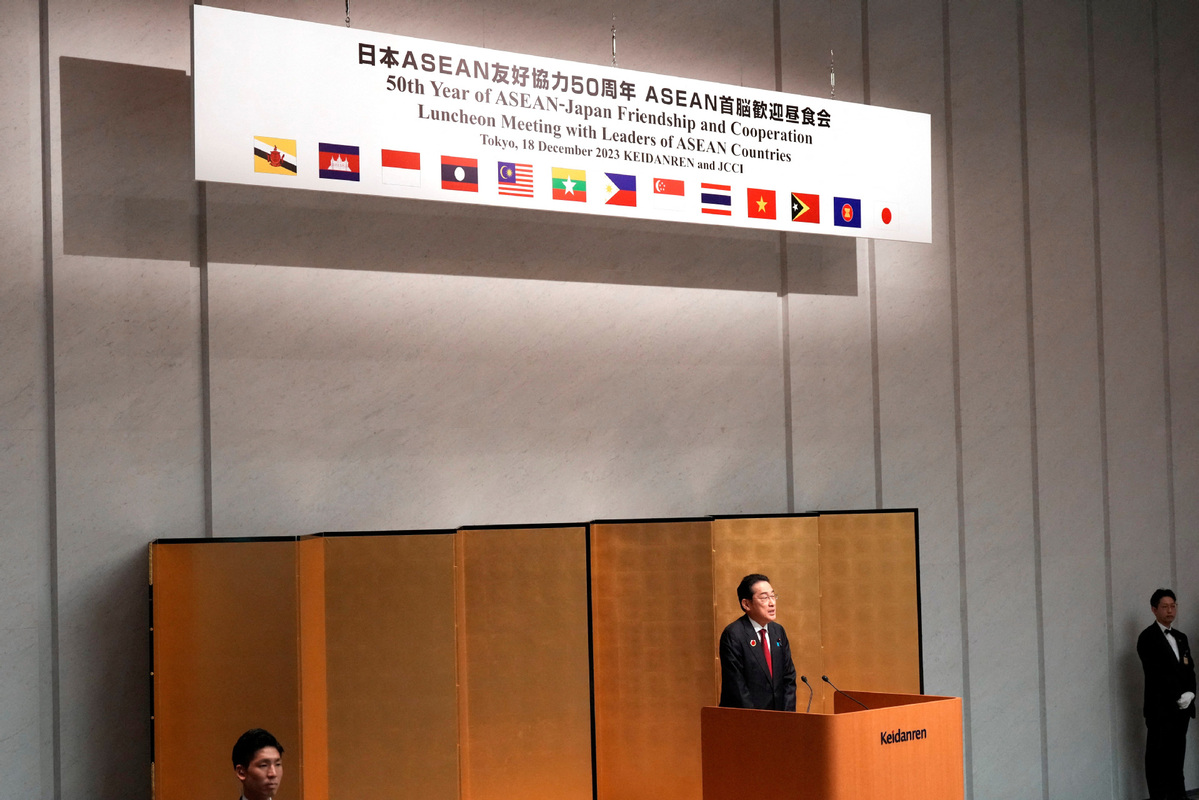Japan urged to stop acting as US 'pawn'
By JIANG XUEQING in Tokyo and CHEN YINGQUN in Beijing | China Daily Global | Updated: 2023-12-20 09:45

Tokyo should not follow Washington's Beijing containment strategy: Experts
Japan should stop blindly aligning with the US containment strategy against China and aggravating tensions in the Asia-Pacific region, experts said.
According to notes signed and exchanged on the occasion of the Commemorative Summit for the 50th Year of ASEAN-Japan Friendship and Cooperation, which closed in Tokyo on Sunday, Japan will strengthen military ties with the Association of Southeast Asian Nations by providing equipment for warning and surveillance activities.
Liu Qingbin, a visiting professor at Huaqiao University in Fujian province, Southeast China, said, "Japan is not only willing to act as a pawn of the United States to disrupt peace and stability in Asia but also has an inherent initiative to seek its own interests by intensifying geopolitical conflicts."
In a bilateral meeting on Saturday, Japan and Indonesia signed and exchanged notes regarding the provision of a large patrol vessel worth up to 9.05 billion Japanese yen ($62.94 million) to Indonesia's coast guard.
On the same day, Japan and Malaysia signed a deal for 400 million yen in Official Security Assistance aid by Tokyo to the Southeast Asian nation. This program aims to provide equipment such as rescue boats, which will be used for Malaysian armed forces' activities such as monitoring and surveillance.
However, Japan's measures are unlikely to succeed, as most ASEAN countries hold different views toward China from those of Japan. ASEAN countries generally pay more attention to economic development and do not want to be affected by geopolitical factors, Liu said.
"On this occasion, the current Japanese government, unconditionally following the US policy, has effectively pledged military support to several ASEAN countries. It is making a mistake by venturing into military cooperation beyond the original purpose of ASEAN, which is economic cooperation," said Takakage Fujita, secretary-general of the Association for Inheriting and Propagating the Murayama Statement, a Japanese civic group dedicated to upholding the 1995 Murayama Statement that admits Japan's wartime mistakes.
Concerns over China are purportedly the reason for Japan to establish Official Security Assistance, ostensibly to enhance stability and deterrence in the "Indo-Pacific" region.
This includes support through the provision of defense equipment to the Philippines, Malaysia, Vietnam and Indonesia, said Kazuyuki Hamada, international political economy scholar and a former parliamentary vice-minister for foreign affairs of Japan.
Japan claimed that it is not inclined to repeat the cycle of war, as desired by many citizens. "However, as seen in the revision of security-related laws last year, Japan is now willing to allow attacks on enemy bases if attacked or if there are clear signs of an impending attack. In that sense, the possibility of being drawn into a war cannot be denied," Hamada said.
Japan's decision to double defense spending over the next five years is in response to the request for burden-sharing from the US.Faced with Russia-Ukraine and Israel-Hamas conflicts, the US finds its involvement in the Asian theater necessarily limited, he said.
Ukeru Magosaki, co-representative of the Association for Inheriting and Propagating the Murayama Statement, said: "The United States perceives a strategic competition with China for influence over ASEAN countries. In implementing this strategy, taking unilateral actions is challenging, and there is hope for Japan to take measures to counter China. It is believed that Japan, aligning with the intentions of the US, has entered into a situation involving military support."
Burden on citizens
Naturally, an increase in military burden would lead to a burden on Japanese citizens, likely resulting in cuts to welfare. There is already opposition to tax increases, Magosaki said.
The Japanese government remains vague in explaining the funding source for doubling defense spending. Many citizens, facing prolonged economic downturns, are seeking increases in take-home pay, reduced consumption taxes, and detailed budget allocations for welfare and education. Elderly individuals and part-time workers already bear a significant burden in medical and child care costs, leading to a sense of unfairness and political distrust, Hamada said.
"To restore public trust in the government, addressing social security and tax inequality should take precedence over increasing military spending. While national security is a critical issue, seeking avenues for crisis avoidance through soft power, such as strengthening diplomatic capabilities, is crucial, rather than relying solely on increased military expenditure," he said.
The policy of the Japanese government, led by Prime Minister Fumio Kishida, to significantly increase military spending will not only damage Japan's finances but also escalate tensions in Asia. The expansion of military expenditure, bringing enormous profits to the US and Japanese military industries, will bring unhappiness to the Japanese people, said Fujita from the Association for Inheriting and Propagating the Murayama Statement.
He advised the Japanese government to "choose the wise path of coordinating with China, expanding mutual interests, and not contributing to escalating tensions in the region", rather than blindly aligning with the US containment strategy against China.
























